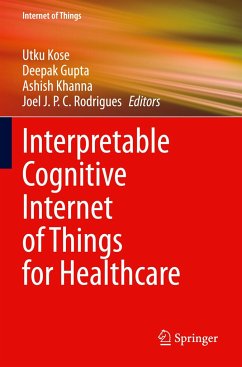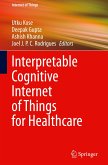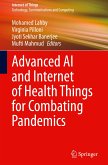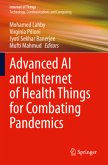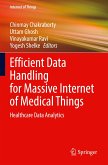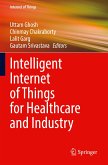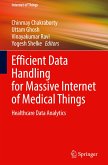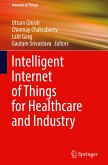Interpretable Cognitive Internet of Things for Healthcare
Herausgegeben:Kose, Utku; Gupta, Deepak; Khanna, Ashish; Rodrigues, Joel J. P. C.
Interpretable Cognitive Internet of Things for Healthcare
Herausgegeben:Kose, Utku; Gupta, Deepak; Khanna, Ashish; Rodrigues, Joel J. P. C.
- Broschiertes Buch
- Merkliste
- Auf die Merkliste
- Bewerten Bewerten
- Teilen
- Produkt teilen
- Produkterinnerung
- Produkterinnerung
This book presents research on how interpretable cognitive IoT can work to help with the massive amount of data in the healthcare industry. The authors give importance to IoT systems with intense machine learning features; this ensures the scope corresponds to use of cognitive IoT for understanding, reasoning, and learning from medical data. The authors discuss the interpretability of an intelligent system and its trustworthiness as a smart tool in the context of massive healthcare applications. As a whole, book combines three important topics: massive data, cognitive IoT, and…mehr
Andere Kunden interessierten sich auch für
![Interpretable Cognitive Internet of Things for Healthcare Interpretable Cognitive Internet of Things for Healthcare]() Interpretable Cognitive Internet of Things for Healthcare89,99 €
Interpretable Cognitive Internet of Things for Healthcare89,99 €![Advanced AI and Internet of Health Things for Combating Pandemics Advanced AI and Internet of Health Things for Combating Pandemics]() Advanced AI and Internet of Health Things for Combating Pandemics123,99 €
Advanced AI and Internet of Health Things for Combating Pandemics123,99 €![Advanced AI and Internet of Health Things for Combating Pandemics Advanced AI and Internet of Health Things for Combating Pandemics]() Advanced AI and Internet of Health Things for Combating Pandemics123,99 €
Advanced AI and Internet of Health Things for Combating Pandemics123,99 €![Efficient Data Handling for Massive Internet of Medical Things Efficient Data Handling for Massive Internet of Medical Things]() Efficient Data Handling for Massive Internet of Medical Things108,99 €
Efficient Data Handling for Massive Internet of Medical Things108,99 €![Intelligent Internet of Things for Healthcare and Industry Intelligent Internet of Things for Healthcare and Industry]() Intelligent Internet of Things for Healthcare and Industry108,99 €
Intelligent Internet of Things for Healthcare and Industry108,99 €![Efficient Data Handling for Massive Internet of Medical Things Efficient Data Handling for Massive Internet of Medical Things]() Efficient Data Handling for Massive Internet of Medical Things108,99 €
Efficient Data Handling for Massive Internet of Medical Things108,99 €![Intelligent Internet of Things for Healthcare and Industry Intelligent Internet of Things for Healthcare and Industry]() Intelligent Internet of Things for Healthcare and Industry108,99 €
Intelligent Internet of Things for Healthcare and Industry108,99 €-
-
-
This book presents research on how interpretable cognitive IoT can work to help with the massive amount of data in the healthcare industry. The authors give importance to IoT systems with intense machine learning features; this ensures the scope corresponds to use of cognitive IoT for understanding, reasoning, and learning from medical data. The authors discuss the interpretability of an intelligent system and its trustworthiness as a smart tool in the context of massive healthcare applications. As a whole, book combines three important topics: massive data, cognitive IoT, and interpretability. Topics include health data analytics for cognitive IoT, usability evaluation of cognitive IoT for healthcare, interpretable cognitive IoT for health robotics, and wearables in the context of IoT for healthcare. The book acts as a useful reference work for a wide audience including academicians, scientists, students, and professionals.
Produktdetails
- Produktdetails
- Internet of Things
- Verlag: Springer / Springer International Publishing / Springer, Berlin
- Artikelnr. des Verlages: 978-3-031-08639-7
- 2023
- Seitenzahl: 208
- Erscheinungstermin: 28. Juni 2024
- Englisch
- Abmessung: 235mm x 155mm x 12mm
- Gewicht: 324g
- ISBN-13: 9783031086397
- ISBN-10: 3031086392
- Artikelnr.: 71183423
- Herstellerkennzeichnung Die Herstellerinformationen sind derzeit nicht verfügbar.
- Internet of Things
- Verlag: Springer / Springer International Publishing / Springer, Berlin
- Artikelnr. des Verlages: 978-3-031-08639-7
- 2023
- Seitenzahl: 208
- Erscheinungstermin: 28. Juni 2024
- Englisch
- Abmessung: 235mm x 155mm x 12mm
- Gewicht: 324g
- ISBN-13: 9783031086397
- ISBN-10: 3031086392
- Artikelnr.: 71183423
- Herstellerkennzeichnung Die Herstellerinformationen sind derzeit nicht verfügbar.
Dr. Utku Kose received the B.S. degree in 2008 from computer education of Gazi University, Turkey as a faculty valedictorian. He received M.S. degree in 2010 from Afyon Kocatepe University, Turkey in the field of computer and D.S. / Ph. D. degree in 2017 from Selcuk University, Turkey in the field of computer engineering. Between 2009 and 2011, he has worked as a Research Assistant in Afyon Kocatepe University. Following, he has also worked as a Lecturer and Vocational School - Vice Director in Afyon Kocatepe University between 2011 and 2012, as a Lecturer and Research Center Director in Usak University between 2012 and 2017, and as an Assistant Professor in Suleyman Demirel University between 2017 and 2019. Currently, he is an Associate Professor in Suleyman Demirel University, Turkey. He has more than 100 publications including articles, authored and edited books, proceedings, and reports. He is also one of the series editors of the Biomedical and Robotics Healthcare Series by CRC Press. His research interest includes artificial intelligence, machine ethics, artificial intelligence safety, optimization, the chaos theory, distance education, e-learning, computer education, and computer science. Dr. Deepak Gupta is an eminent academician; plays versatile roles and responsibilities juggling between lectures, research, publications, consultancy, community service, Ph.D. and post-doctorate supervision, etc. With 13 years of rich expertise in teaching and two years in the industry; he focuses on rational and practical learning. He has contributed massive literature in the fields of Human-Computer Interaction, Intelligent Data Analysis, Nature-Inspired Computing, Machine Learning, and Soft Computing. He is working as Assistant Professor at Maharaja Agrasen Institute of Technology (GGSIPU), Delhi, India. He has served as Editor-in-Chief, Guest Editor, Associate Editor in SCI, and various other reputed journals. He has authored/edited 44 books with National/International level publishers (Elsevier, Springer, Wiley, Katson). He has published 158 scientific research publications in reputed International Journals and Conferences including 80 SCI Indexed Journals of IEEE, Elsevier, Springer, Wiley, and many more. He is senior IEEE member too. He has 3 published patents to his credit. Dr. Ashish Khanna has 16 years of expertise in Teaching, Entrepreneurship, and Research & Development He received his Ph.D. degree from the National Institute of Technology, Kurukshetra in 2017. He has completed his M. Tech. in and B. Tech. from GGSIPU, Delhi in the year of 2009 and 2004 respectively. He has completed his postdoc from the Internet of Things Lab at Inatel, Brazil, and the University of Valladolid, Spain. He has around 61 SCI-indexed papers in IEEE Transaction, Springer, Elsevier, Wiley, and many more reputed Journals with a cumulative impact factor of above 175 to his credit. He has published around 125 research articles in the form of top SCI/ Scopus journals, conferences, and book chapters. He is a co-author and co-editor of around 28 edited and textbooks. His research interest includes Data Science, Bio-Medical, Distributed Systems, MANET, FANET, VANET, IoT, Evolutionary Computing, and many more. He has served the research field as a Keynote Speaker/ Faculty Resource Person/ Session Chair/ Reviewer/ TPC member/ post-doctorate supervision. He is convener and Organizer of ICICC and ICDAM conference series. He is currently working as Associate Prof. at the Department of Computer Science and Engineering, Maharaja Agrasen Institute of Technology, under GGSIPU, Delhi, India. He is also serving as series editor in Elsevier and De Gruyter. He is senior IEEE member too. He has 3 published patents to his credit. Prof. Joel J. P. C. Rodrigues (joeljr@ieee.org) [S'01, M'06, SM'06, F'20] is a professor at the Federal University of Piauí (UFPI), Brazil; senior researcher at the Instituto de Telecomunicações, Portugal; and collaborator of the Post-Graduation Program on Teleinformatics Engineering at the Federal University of Ceará (UFC), Brazil. He has been professor at the National Institute of Telecommunications, Brazil; University of Beira Interior (UBI), Portugal and visiting professor at the University of Fortaleza (UNIFOR), Brazil. He received the Academic Title of Aggregated Professor in computer science and engineering from UBI, the Habilitation in computer science and engineering from the University of Haute Alsace, France, a PhD degree in computer science and engineering and an MSc degree from the UBI, and a five-year BSc degree (licentiate) in computer science and engineering from the University of Coimbra, Portugal. His main research interests include IoT and sensor networks, ehealth technologies, vehicular communications, and mobile and ubiquitous computing. Prof. Rodrigues is the leader of the Next Generation Networks and Applications research group (CNPq), IEEE Distinguished Lecturer [2018-2021], Director for Conference Development - IEEE ComSoc Board of Governors [2018- 2019], Technical Activities Committee Chair of the IEEE ComSoc Latin America Region Board [2018-2019], the President of the scientific council at ParkUrbis - Covilhã Science and Technology Park, a Past-Chair of the IEEE ComSoc Technical Committee on eHealth, a Past-chair of the IEEE ComSoc Technical Committee on Communications Software, Steering Committee member of the IEEE Life Sciences Technical Community and Publications co-Chair, and Member Representative of the IEEE Communications Society on the IEEE Biometrics Council. He is the editor-inchief of the International Journal on E-Health and Medical Communications and editorial board member of several high-reputed journals. He has been general chair and TPC Chair of many international conferences, including IEEE ICC, IEEE GLOBECOM, IEEE HEALTHCOM, and IEEE LATINCOM. He is a member of many international TPCs and participated in several international conferences organization. He has authored or coauthored over 900 papers in refereed international journals and conferences, 3 books, 2 patents, and 1 ITU-T Recommendation. He had been awarded several Outstanding Leadership and Outstanding Service Awards by IEEE Communications Society and several best papers awards. Prof. Rodrigues is a licensed professional engineer (as senior member), member of the Internet Society, a senior member of ACM, and an IEEE Fellow.
Introduction.- Essentials of Cognitive IoT for Healthcare.- Interpretability Problem in IoT for Healthcare.- Transparent and Black-Box IoT Systems for Healthcare.- Evaluation of Cognitive Capabilities of IoT in Healthcare.- Massive Health Data Analytics for Cognitive IoT.- Usability Evaluation of Cognitive IoT for Healthcare.- Hybrid Methods for Interpretable IoT for Healthcare.- Interpretable Cognitive IoT for Pandemics.- Interpretable Cognitive IoT for Cancer.- Interpretable Cognitive IoT for Sustainable Massive Health.- Interpretable Cognitive IoT for Health Robotics.- Interpretable Cognitive IoT for Personal Healthcare.- Wearables in the Context of IoT for Massive Healthcare.- Security for Massive Health Data Used by Cognitive IoT.- Future Insights for Interpretable Cognitive IoT in Healthcare.- Conclusion.
Introduction.- Essentials of Cognitive IoT for Healthcare.- Interpretability Problem in IoT for Healthcare.- Transparent and Black-Box IoT Systems for Healthcare.- Evaluation of Cognitive Capabilities of IoT in Healthcare.- Massive Health Data Analytics for Cognitive IoT.- Usability Evaluation of Cognitive IoT for Healthcare.- Hybrid Methods for Interpretable IoT for Healthcare.- Interpretable Cognitive IoT for Pandemics.- Interpretable Cognitive IoT for Cancer.- Interpretable Cognitive IoT for Sustainable Massive Health.- Interpretable Cognitive IoT for Health Robotics.- Interpretable Cognitive IoT for Personal Healthcare.- Wearables in the Context of IoT for Massive Healthcare.- Security for Massive Health Data Used by Cognitive IoT.- Future Insights for Interpretable Cognitive IoT in Healthcare.- Conclusion.

